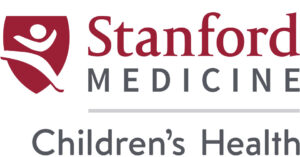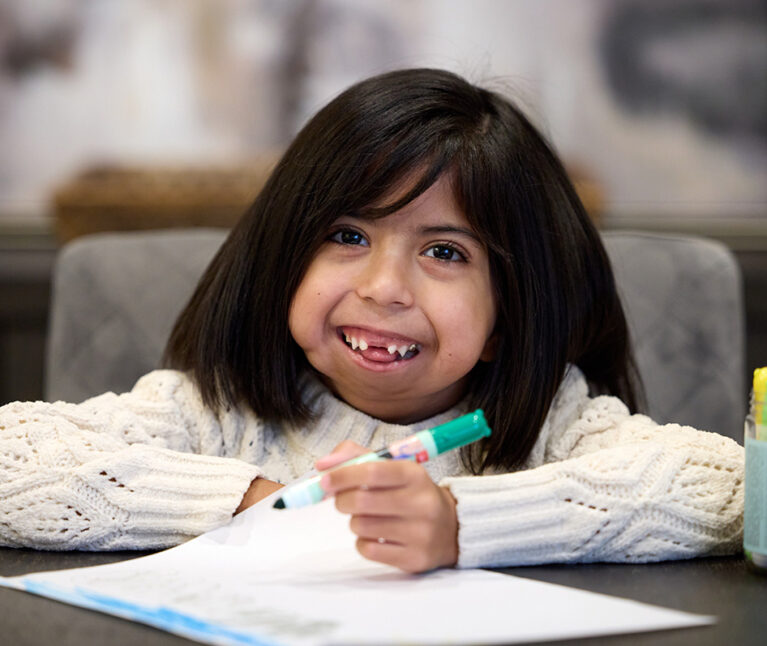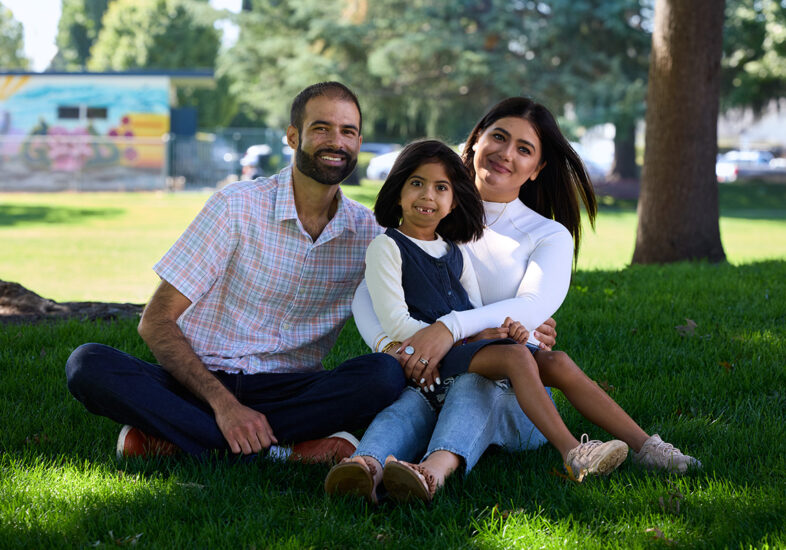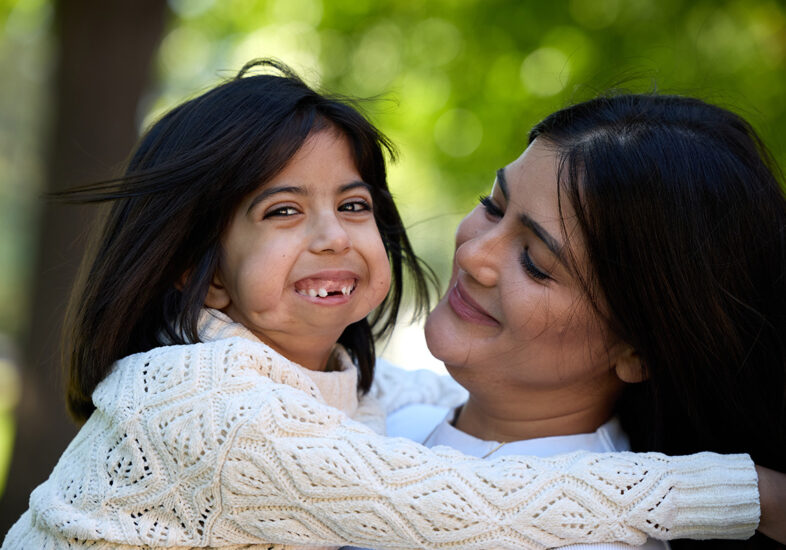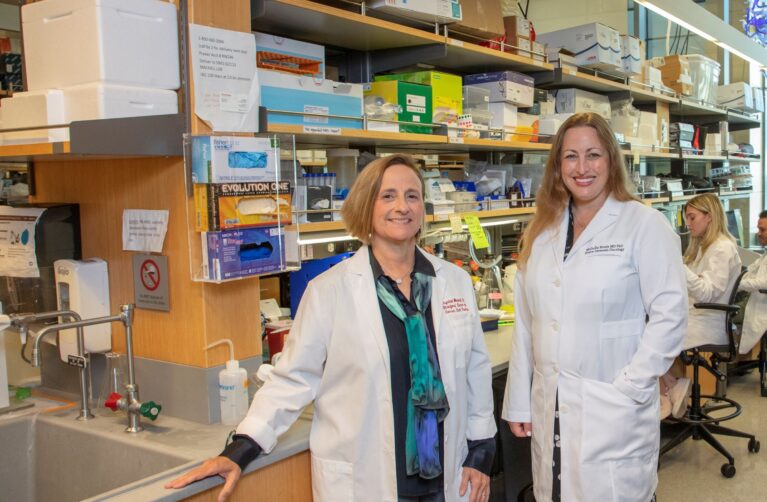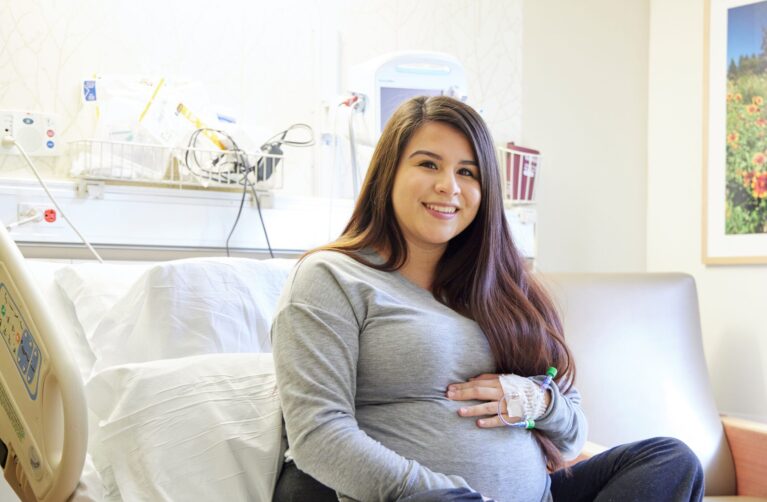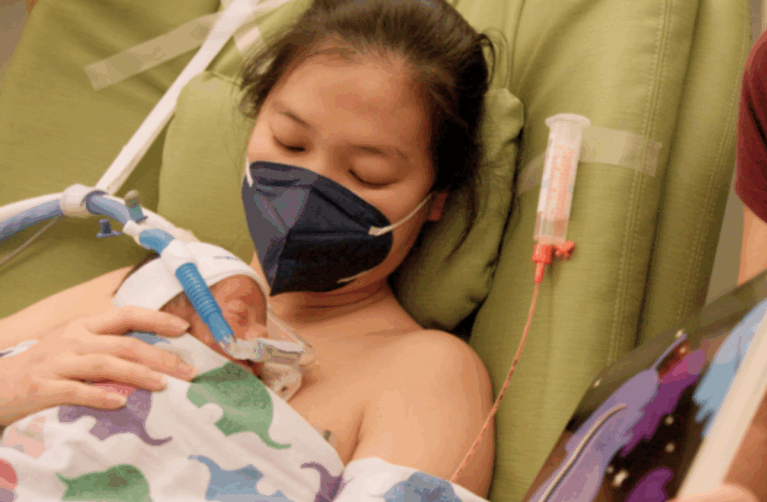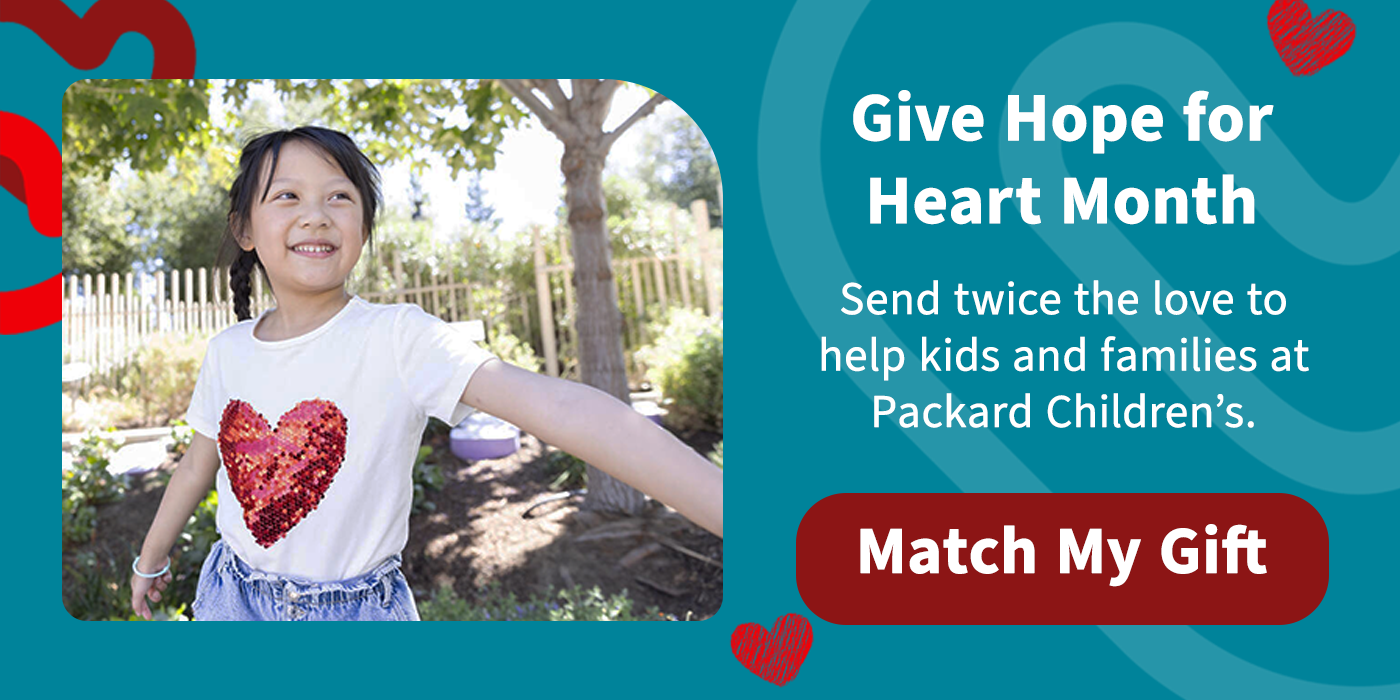“Believe it or not, Arya is super social,” explains mom Shubh with a laugh. “I don’t know how, because first she was in the hospital as a baby, then we came home, and she had her surgery. Just as we were making so much progress with her growing and eating, and looking forward to doing all the normal things, COVID happened, and we were in a crazy lockdown.”
Enjoying an Active, Full Life
For a little girl who has already endured a lot, Arya is able to find joy in the little things in life, thanks to her Lucile Packard Children’s Hospital Stanford care team.
“She plays tennis, which she picked up from watching her grandpa,” Shubh says. “And she also models for my [clothing] brand. Seeing her do these incredible things means a lot.”
Arya’s life started with an emergency C-section at a Sacramento hospital about an hour away from her family’s home in Yuba City. Shubh’s pregnancy had been very difficult, but there weren’t any significant signs that something was wrong until the third trimester. Shubh’s amniotic fluid was measuring unusually high, necessitating the emergency delivery of her baby at 38 weeks.
As soon as Arya was born, the care team knew something was wrong, but they weren’t sure of the underlying cause. Arya’s lower jaw was severely underdeveloped, she had a cleft palate, and her airway was incredibly narrow. She was rushed to the hospital’s neonatal intensive care unit (NICU), two floors away from her mother.
“The first two weeks of Arya’s life we didn’t have a diagnosis,” Shubh recalls. The care team kept Arya on her stomach 24 hours a day so her tongue wouldn’t slide back and block her airway. It was a stark beginning to parenthood for Shubh and her husband, Akash.
Then a geneticist delivered the news that would finally give the family some answers: Arya had auriculocondylar syndrome (ACS), a rare genetic condition that affects facial development, particularly the ears and lower jaw. The Sacramento doctors started proposing extensive surgical solutions that made Shubh and Akash uneasy.
Finding Packard Children’s
The couple and their family dove into research and came across H. Peter Lorenz, MD, a craniofacial surgeon at Packard Children’s Hospital.
“We reached out to Dr. Lorenz via the website, and he called us back personally,” Shubh recalls, reflecting on how calm and thoughtful the doctor was and how confident he was that he could help Arya. “We were in the car when we spoke to him, and by the time we were back up in the unit, everything was in motion. The Packard Children’s Critical Care Transport Team was on their way to get Arya, and we were in Palo Alto that afternoon. It was just so smooth and a big relief.”
Two-week-old Arya’s first stop was our NICU where she was stabilized and evaluated. Thankfully, Arya’s condition was less severe than most other children with ACS, so the team didn’t need to perform a tracheostomy to provide an airway. But they did put together a plan for a mandibular distraction surgery to lengthen Arya’s jaw so she could breathe and, eventually, eat easier.
“What is so unique about Packard Children’s is our multidisciplinary approach,” explains Arya’s nurse practitioner, Elena Hopkins, RN, MS, CPNP, program manager for the Cleft and Craniofacial Center. “We used imaging studies and a clinical exam to inform our cross-team conversation where we determined the timing and specific procedure that would lead to the best outcome for Arya.”
To prepare, Lorenz and his team performed a virtual surgery, using CT scan images and computers to simulate the surgical process as well as the placement of hardware needed for movement of the jaw. Ultimately, the discussions, review, and evaluation showed that Arya was just too little and did not have enough bone for the surgery to be successful.
“We were blown away by their ability to learn so much from the virtual surgery,” Shubh says. “Obviously, it was hard to hear that they couldn’t proceed yet, but I am grateful they did their part as doctors and told us it wasn’t the right time, and they wanted to let her grow a bit.”
The care team trained Shubh to insert the nasogastric (NG) tube that would be used to feed Arya and sent the family home to Yuba City so Arya could be comfortable, gain weight and bone growth, and be prepared for a successful surgery when the time was right. The team thought of everything, from ordering a special bed-like car seat so Arya could safely lie flat on the ride home, to timing the family’s discharge so their three-hour drive home wouldn’t be made worse with traffic.
But the time at home was short-lived. Two weeks later, Arya contracted a virus and returned to the Packard Children’s NICU. Her underdeveloped airway made respiratory infections even more dangerous, but the team helped her recover and be in a stronger place for the surgery to have the best outcome.
The Wait Was Over
Lorenz performed a mandibular distraction on Arya’s lower jaw when she was 7 months old. The procedure entails affixing hardware that allows for the gradual expansion of the patient’s jaw.
“Arya’s family was extraordinary,” recalls Hopkins. “They asked good questions and were so brave. They had such trust in the team. No one knows Arya better than they do, so we relied on their perspective to tell us when it was or wasn’t a good time to do the twice-daily jaw-expansion steps. That open communication was vital for us to be successful.”
“Arya’s journey through the distraction surgery process was much more complicated than usual,” recalls Dr. Lorenz. “I am so happy that Shubh and Akash were present with her every day and night in the hospital. This support had a hugely positive impact on Arya’s successful outcome.”
Following the surgery, Arya was in the hospital for three weeks before she was able to return home.
Over the following year, she met with occupational therapists to help her learn how to talk and eat, and she underwent additional procedures to address hearing challenges. It was an exciting day when her NG tube was finally removed. To Shubh and Akash’s delight, Arya loves to eat. She has developed a special passion for In-N-Out Burger fries and Panera Bread’s macaroni and cheese.
“I told her once, ‘You can’t have macaroni and cheese every day,’” Shubh laughs, “She said, ‘I cannot wait to be a grown-up, because then I’ll have my own car, and then I’ll go to Panera every day and get mac and cheese.’”
Shubh is grateful for the hope and compassionate care that our hospital provided when she and her husband were overwhelmed new parents navigating their baby’s difficult diagnosis.
Arya just turned 6 years old. As she continues to grow, there will likely be more surgeries to address the effects of ACS, but today she is home and thriving. She had a Trolls-themed birthday party, loves watching Moana and Frozen, and is the apple of her parents’ and grandparents’ eyes.
Your donations ensure access to world-class care for every child like Arya. Donate now.
Give Now to Help Children Like Arya
Every dollar donated goes to helping support children and families at Lucile Packard Children's Hospital, Stanford.
